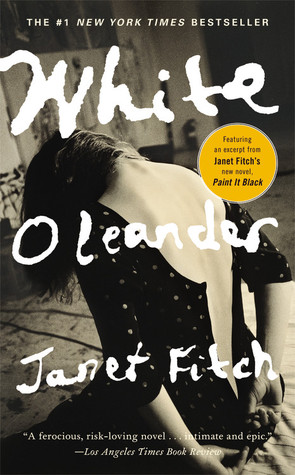 Title: White Oleander
Title: White OleanderAuthor: Janet Fitch
Read: December 21, 2013
Summary: When Astrid's mother, a beautiful, headstrong poet, murders a former lover and is imprisoned for life, Astrid becomes one of the thousands of foster children in Los Angeles. As she navigates this new reality, Astrid finds strength in her unshakable certainty of her own worth and her unfettered sense of the absurd. goodreads
Review: This book is heart wrenching. Following Astrid through the series of foster homes and the people she has to deal with is tough to do and really makes you feel for her when you think about the fact that she had to actually experience these things from a young age. That being said, all of these crazy women who foster her help her to discover who she is and have an impact on the person she has become which is beautiful in it's own way.
Even though the story focuses mostly on Astrid's relationships with her foster families, the real focus is on Astrid and Ingrid's (her mother) relationship. From the start, I despised Ingrid for who she was as a mother and a person. She was selfish and did things her own way, regardless of the consequences, because she was an unique, artistic, individual. Frankly, she gives unique, artistic, individuals a bad name. Throughout the book it is clear the impact the person she was had on Astrid, both good and bad.
In the beginning of the book, it seems as though Astrid feels guilty for just existing and burdening her mother with the responsibility of taking care of her. She is constantly taking the blame for anything that goes wrong and internalizes all of the issues. At that point in her life, Astrid could never imagine blaming her mother for the things that were going wrong (which of course were a direct result of Ingrid's actions.) As the story progresses and Ingrid goes to jail, Astrid is forced into numerous foster homes which give her new perspectives of the world. It is obvious that Astrid was lacking in the mother department and while these homes are wretched most of the time, they also expose Astrid to other ways of living and thinking which is ultimately, for her benefit. They give her someone to compare Ingrid to and sometimes, Ingrid actually comes out on top. Not to give credit to Ingrid but some of the moms were just so horrible that they made her look good.
Astrid's view of her mother also begins to change as she grows up. She begins to see the evil Ingrid is capable of and her numerous faults. I believe this enlightenment happens with every daughter and mother to some extent. Not that girls start to see their mothers as evil, but they start to see their parents as human beings rather than untouchable super heroes. They realize there are flaws and mistakes that they had missed when growing up and this realization can be hard for any child. It was very hard for Astrid. Especially when she had so many "mothers" to compare Ingrid to. In the end, Ingrid found a way to redeem herself to an extent which made me not hate her as much but it didn't change all of the damage she did to Astrid. Through this journey, Astrid starts to see reality and the ugly truth. She goes from being naive to a little jaded but she is a survivor and finds ways to make all of her experiences work for her rather than hinder her.
I loved this book and the writing was lyrical and poetic at times. The bond between a mother and her daughter can be beautiful and deep but also very confusing and complicated and this story shows that in many different ways. I would definitely recommend!


No comments:
Post a Comment